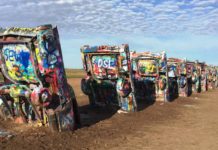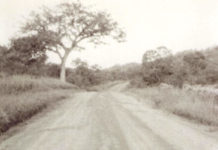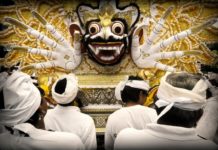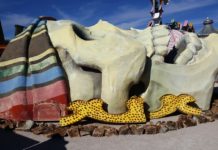CHAPTER 1
Buy the ticket, take the ride – Hunter S. Thompson
On a typical beautiful August day, a few of my closest pals and I were sitting around the huge, psychedelically painted table in the apartment I shared with my best friend, Ted Sutton. I had purchased it at a garage sale shortly after we moved in. It was an enormous slab of wood about six feet long, four feet wide, and two inches thick. In its previous life, it was a library table. The legs had been cut down to about two feet, which made it perfect for a coffee table.
Although I had no artistic talent at all, I bought a paint kit and began to randomly apply colorful patterns and designs on it. I did this just to kill time, but the table quickly became a conversation piece and a meeting place. People we knew would stop by, sit around the table, smoke a little pot, have a couple beers, listen to some music, and talk about whatever was on their mind. Then they would paint something on the table. Day by day, it grew into a very colorful, ever-changing mosaic.
My group of close friends was made up of Ronald Parsons, Paul Alexander, Charlie Pollard, and Ted. We’d all grown up together, gone to the same schools, and did the usual things kids did in a middle-class, suburban community. The Beach Boys, Jan and Dean, and The Beatles provided much of our soundtrack. It was the beginning of the sixties, and it was an amazing time to be alive.
Southern California was the perfect place to be young and free. We played on some of the world’s most famous beaches, and we were outdoors and tan all year long. Sometimes we’d be gone all day riding around on our bikes, hanging out at the park, or visiting a friend’s house without our parents ever worrying about us. The ominous events looming on the horizon were the furthest thing from our minds.
The first really bad thing I remember happening was the assassination of President John F. Kennedy. I was 11 years old and sitting in Mr. Smith’s fifth-grade class at McKinley Elementary School in Pasadena. We’d been watching a closed-circuit television broadcast of our Spanish lesson that day, when suddenly the principal came into the room and whispered in Mr. Smith’s ear. He instantly turned pale and got a look that we recognized as one you never want to see on a grownup’s face.
We knew something important was about to happen. I don’t remember the exact words he used to tell us that somebody had killed the president, but he told us, and then he began to cry. That really freaked us out, and we were informed that school was over for the day. It was Friday, November 22, 1963, a day we would all use as a reference point for everything else that would happen to us from that moment on.
“Often, you were either classified as a patriotic American who believed our government was doing the right thing, or you were some hippie, communist sympathizer who did not.”
But that was only the beginning. Just a few years later, by the end of the sixties, it felt like the whole country was coming apart. It’s hard to believe how much bad news there had been in such a short time.
I remember my father coming into my bedroom to wake me up the night Senator Robert F. Kennedy was killed at the Ambassador Hotel in Los Angeles, just a few miles from our home. He wanted me to watch the breaking news coverage of the latest tragic, but historic event. This came on the heels of the equally shocking assassination of Martin Luther King Jr. only two months prior.
My friends and I were teenagers, and we were witnessing seismic changes in politics and music, not to mention the sexual revolution and the social upheaval of the Civil Rights Movement. The war in Vietnam came at us so fast, and we were all trying to figure out how to handle it.
We were swept up in a cultural storm and social revolution that we could not ignore. By the beginning of the seventies, our society had witnessed several assassinations, numerous riots in the streets, and the election of Richard Nixon. There was also a man landing on the moon, the Woodstock Festival, the Rolling Stones concert at Altamont, and the breakup of The Beatles.
The Vietnam War dominated the news coverage, especially on television. A heated debate was raging across the country, and the battle lines were clearly drawn. You either supported the war or you didn’t. There truly wasn’t any middle ground.
Some people sized you up immediately based on how you felt about the war or by the length of your hair. Often, you were either classified as a patriotic American who believed our government was doing the right thing, or you were some hippie, communist sympathizer who did not. The young people that I knew and hung around with were mostly the latter, probably because we were the ones being made to fight the war, or maybe because we protested against it so loudly and publicly.
“People started doing crazy things to avoid getting drafted, like cutting off a toe or getting really messed up on drugs before going in for their Army physicals.”
My parents followed the news closely. They were the kind of people who read The Los Angeles Times from cover to cover every morning and watched George Putnam’s news broadcast on television every evening. Then they would talk about all of it at the dinner table.
Putnam’s 10 p.m. newscast was enormously popular in Southern California, and millions shared his “America, love it or leave it” attitude.
His deep, booming voice began each newscast with the dramatic introduction, “It’s ten o’clock. Do you know where your children are?”
My dad would answer, “Damn right I do!”
My parents agreed with a lot of what George Putnam said, but they eventually came to believe he was a nutjob and an extremist.
Ray and Lois Cockrell were what I would describe as moderately conservative. My dad was fond of using such phrases as, “They ought to string that son of a bitch up by the nearest god damn telephone pole!” whenever he saw some murderer or other heinous criminal on the news. But when it came to the Vietnam War, I sensed that they were as conflicted about it as I was.
Unlike a lot of kids growing up in the sixties, I felt like I had the best parents in the world. We had our differences about things like long hair and loud music, but we were closer than a lot of my friends were with their parents. The Vietnam War was dividing families all over America, but so far we had not become one of them.
Every day on television we saw new footage of wounded soldiers exhibiting horrible injuries and dead soldiers coming home in those all-too-familiar, flag-draped, aluminum coffins. Life Magazine brought the war into our homes in the form of iconic photographs that would haunt our memories for decades. The Selective Service System and the draft fueled the fire of protests all over the country, and hundreds of thousands of young people were demanding an end to the war.
Many young American men had avoided getting drafted in previous years because they were married or attending college, but those deferments ended in 1969. After that, people started doing crazy things to avoid getting drafted, like cutting off a toe or getting really messed up on drugs before going in for their Army physicals. A lot of guys said they were homosexual or claimed to be mentally ill. Some families saw their sons leave for Canada, and some of those who left rejected their American citizenship outright. Others simply went to jail rather than go to war.
One friend of mine, Bill, became as thin as he possibly could before going in for his Army physical. It was an attempt to get below the minimum weight requirement. He soon learned, however, that the Army had no problem with it. They were used to seeing pathetic, little wimps like him, and they planned to fatten him up in no time at all.
As a backup plan, my underweight friend asked to see the psychiatrist. He was hoping to convince him that he was not mentally fit to serve in the military due to a long history of LSD use. The doctor laughed at him as if to say, “That’s the oldest trick in the book!”
To everyone’s surprise, including his own, Bill was diagnosed with severe mental illness and ultimately rejected by the Army. In fact, the psychiatrist felt so sorry for him, he advised him to seek professional help for his own good. The shrink assured him that with the right therapy, he could still be a productive member of society. Rejection was never so sweet.
“I had strong anti-war sentiments long before I ever experimented with drugs.”
When Bill told his parents what happened, they were mortified. His father, who was a World War II veteran, wasn’t bothered nearly as much by his son’s attempt to avoid conscription as he was by his deceptive methods. Bill’s mom and dad were convinced that he would regret his actions for the rest of his life. How would he ever get a decent job if it were publicly known that the Army considered him to be mentally unbalanced?
Of course, Bill was very proud of himself, and we were too! The story of his rapid weight loss and feigned insanity quickly turned him into a local legend.
Another friend of mine, Ben, got so high on speed before he went in for his physical that his heart rate was off the charts. His eyes were wildly dilated, and he was hyperventilating when he was examined. Inexplicably, he passed with flying colors, and the army ordered him to report for duty. Shortly after that, he went to Canada, and none of us ever heard from him again. To this day, we have no idea what happened to him.
All throughout this upheaval, George Putnam’s evening newscast brought the war-related drama into our homes in great detail. There were constant scenes of angry-looking hippies burning their draft cards and fighting in the streets with police. Putnam would frequently interject that they had absolutely no respect for law and order.
According to Putnam, and others like him, a lot of these kids were either high on drugs, or they’d been negatively influenced by rock ‘n’ roll music. Clearly, he believed, the Communists were using music to brainwash them. Old George was definitely onto something about the powerful influence of rock ‘n’ roll, but I can tell you with absolute certainty that the Communists did not control my mind.
My very first concert was in 1965, when I saw The Beatles at the Hollywood Bowl. My dad was a real estate broker, and one of his clients had a box seat there, so I went with a lady and her 13-year-old daughter. It was a life-altering experience for me. By the time I graduated from high school in 1970, the music my friends and I were enjoying had come a long way from “I Want to Hold Your Hand” by the Beatles and “Little Surfer Girl” by the Beach Boys.
Music had become a central part of my life. I was heavily into the San Francisco scene, and it wasn’t lost on me that all of the rock stars I admired and the disc jockeys I listened to were opposed to the war.
Crosby, Stills, Nash and Young were singing about the four who died on the campus of Kent State in their song “Ohio,” and Graham Nash was singing about the Chicago Seven trial, with the opening line “So your brother’s bound and gagged, and they’ve chained him to a chair.” And Grace Slick of Jefferson Airplane had the shocking line “Up against the wall motherfucker!” in the song “We Can Be Together.”
Yeah, there was something happening here all right, and I was being caught up in it whether I liked it or not. It wasn’t difficult for me to figure out which side I was on. All of the major cultural influences of the day, not just the rock ‘n’ roll music I listened to, but the books I read and the movies I saw were clearly opposed to the war. I had strong anti-war sentiments long before I ever experimented with drugs.
Drug use was my final frontier. I knew that it would be an act of defiance against my parents. More importantly, it was the demarcation between everything in my life that happened before and after the moment I first tried them. I saw it as a point of no return, and that’s exactly what it was.
“We had a reputation for having a great place to party with a very well-stocked bar, so our apartment was often packed with visitors.”
I’d resisted smoking marijuana longer than any of my peers. I’m fairly certain that I was the only one in my high school who hadn’t smoked pot by 1970. When I tried it for the first time, it was an epiphany. In fact, it was so fantastic, so wonderful, that I was amazed at how negatively it had been portrayed by people like George Putnam.
I couldn’t help but wonder if so many people had lied to me about marijuana, what else had they lied about? Had they lied about other drugs too? It wasn’t long before I tried LSD. Psychedelics opened up my mind to an entirely new world of possibilities and generated thoughts and realizations that I had never imagined before.
I started reading a lot of poetry. I loved some of the darker poems of Sylvia Plath and Leonard Cohen, and I was very into Gregory Corso, Lawrence Ferlinghetti, and all of the beat poets. I was interested in Timothy Leary, too, and I became a big fan of the books of Carlos Castaneda and Aldous Huxley.
My mother worked at Caltech in the office of Beckman Auditorium. She got me tickets to all kinds of great events that took place there from Shakespeare, to silent films, to jazz concerts, and even a lecture by Timothy Leary. I heard him elaborate on his trademark phrase, “Turn on, tune in, drop out.” I’d heard the phrase before, but now, hearing him explain it, it suddenly made perfect sense. If you turned on your mind, then tuned in to what was happening in the world, sometimes it seemed like a good idea to just drop out of life for a while.
Shortly after graduating from high school, I started attending classes at Pasadena City College. I wasn’t sure what I wanted to be, so I majored in Forestry but later switched to English. Around the same time, my best friend Ted and I moved into the Penthouse Apartments in Pasadena. We shared a large, two-bedroom apartment that had one bathroom and a balcony overlooking the swimming pool. The building was filled with college students and was a very happening place to live.
Ted was a little taller than I was, about 6’3″ with a lanky, yet muscular frame. He had a head full of thick, curly, black hair that he wore pretty long. My parents would never tolerate anything even resembling long hair like his. He was athletic and in great physical shape from playing hockey in Canada where he was born. Ted and I were the best of friends during high school. We lived a few, short blocks from each other and spent a lot of time together.
His mother suffered from multiple sclerosis and was confined to a wheelchair. Ted’s father was her tireless caregiver and would feed and bathe her. Ted often helped out a lot too. It was a very difficult situation for all of them. Ted’s mother was the first totally disabled person I’d ever known, and it always made me sad when I visited. Later in life, I would have a similar experience with my own son, Will.
“I couldn’t fathom how the government could just come into my life and order me into military service against my will.”
Ted worked at Gerlach’s Liquor Store in Pasadena and helped me get a job there. We stocked the shelves and occasionally ran the cash register. A lot of our friends came by because it was one of those neighborhood places where kids would buy cigarettes and candy and hang out. On weekends we made deliveries, sometimes to our friends or wherever the best party in town was that night, which was usually at our apartment.
I admired Ted a lot. He was more mature than I and also cooler, in a James Dean sort of way. All the girls really liked him. Ted and I were definitely two of the more eligible bachelors in town. We had a reputation for having a great place to party with a very well-stocked bar, so our apartment was often packed with visitors.
Then, in the summer of 1971, on what would have normally been another lazy, Saturday afternoon, there was an unfamiliar tension in the air. Today we would learn our numbers, the numbers that would determine who would get drafted and be sent to Vietnam. We’d been listening all day to KMET, the local rock radio station, for the results of the lottery being held that afternoon by the Selective Service System. The Army was only drafting men who had been born in 1952, and that applied to all of us.
The lottery worked like this: All the dates of the year were written down, put into plastic capsules, and mixed inside a large, glass jar. Then the capsules with the dates inside were randomly drawn. The order in which your birthdate was pulled out of the jar determined the order in which you could be drafted at a later date. After everyone who qualified from the first date was drafted, the Army would move on to the next date that had been drawn from the jar on this nerve-racking day.
For example, in this particular lottery, December 4th was the first date drawn, so if that was your birthday, your lottery number was one. Any uncertainty about your draft status was now resolved; you were going. January 25th was the second date drawn, so if that was your birthday, your lottery number was two. All 366 capsules were pulled out of the glass jar one at a time, until each date of the year was assigned a lottery number.
If you got lucky and drew a high number, say 350 or so, you could be fairly certain that you would not get drafted, and you could plan your life accordingly. If your number was somewhere in the middle, like 150, then you might or might not be drafted, depending on how many men they’d recruited from previous numbers. You would just have to wait on pins and needles for a while to see what your fate would be.
The entire process was bizarre and humiliating. My future depended on the luck of the draw, as if I were playing Russian roulette, except someone else was holding the gun and spinning the cylinder.
It was a confusing time for me. I was vehemently against the war, but I was also full bore into living my life in the heady times of the day. Hell, I was a teenager! I was a bit nuts and crazed on pot, alcohol, and hormones. I couldn’t fathom how the government could just come into my life and order me into military service against my will. I couldn’t believe this was happening to me.
That afternoon, as we heard our numbers being drawn, each of us painted them on the table in some psychedelic design. Everyone in the room was pretty lucky and drew high numbers except for me. My birthday, September 2, was number 70 out of a possible 366.
I painted a large 70 in swirling blue and purple colors in the corner of the table. Ronald’s number was 181. Paul drew 215. Ted was less lucky with 119, but he was Canadian by birth and not really eligible. He painted his number on the table anyway. In the following days, everyone we knew stopped by and added their number.
Out of all my friends, my number was the lowest, and the exact meaning of that began to slowly sink in. I realized that my life was about to drastically change, and there was nothing I could do about it. Nothing would ever be the same again.
I had just won the lottery.










